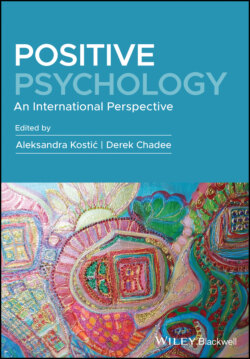Читать книгу Positive Psychology - Группа авторов - Страница 23
Evolutionary function of empathy‐induced altruism
ОглавлениеRather than inclusive fitness (Hamilton, 1964) or reciprocal altruism (Trivers, 1971), the most plausible answer seems to be that empathy‐induced altruistic motivation evolved as part of the parental instinct among higher mammals, especially humans (Batson, 2010, 2011, 2018; Bell, 2001; De Waal, 1996; Hoffman, 1981; McDougall, 1908; Zahn‐Waxler & Radke‐Yarrow, 1990). If mammalian parents were not intensely interested in the welfare of their very vulnerable progeny, these species would quickly die out.
We humans have no doubt inherited key aspects of our parental instinct from ancestors we share with other mammalian species (Preston, 2013). But in humans this instinct seems less automatic and more flexible. Human parental nurturance goes well beyond nursing, providing other kinds of food, protecting, and keeping the young close – activities that characterize parental care in most mammalian species. It includes inferences about and anticipation of the desires and feelings of the child (“Is that a hungry cry or a wet cry?” “She won’t like the fireworks; they’ll be too loud.”). It also includes goal‐directed motives and appraisal‐based emotions (Scherer, 1984). Crucially, it seems to include (a) other‐oriented feelings of empathic concern for the child and (b) empathy‐induced altruistic motivation to protect and increase the child’s welfare.
Parental care based on empathic concern didn’t supplant the more primitive cue‐based responses of our ancient ancestors. Instead, it supplemented these responses by increasing the flexibility with which they are employed (see Bell, 2001; Damasio, 2002; MacLean, 1990; Sober, 1991; Sober & Wilson, 1998; S. E. Taylor, 2002; Zahn‐Waxler & Radke‐Yarrow, 1990). This flexibility permits anticipation and prevention of needs – even evolutionarily quite novel ones such as the need to avoid sticking a pin in an electrical outlet.
Importantly, the empathy‐altruism research shows that we humans don’t experience empathy‐induced altruistic motivation only in response to the needs of our own children. As long as there’s no preexisting antipathy, we can feel empathy for a wide range of others in need, including nonhumans (Batson, Lishner, Cook, & Sawyer, 2005; Shelton & Rogers, 1981). Speculating, let me suggest that this breadth of human empathy‐induced altruism may reflect cognitive generalization whereby we “adopt” cared‐for others as progeny, producing empathic concern and altruistic motivation when they are in need (Batson, 2011; Hoffman, 1981).
To the extent that the human nurturant impulse relies on appraisal‐based other‐oriented emotions such as empathic concern, it should be relatively easy to generalize. And two specific factors may have facilitated the emergence of such generalization: (a) human cognitive capacity, including the capacity for symbolic thought and analogic reasoning; and (b) lack of evolutionary advantage for limiting empathic concern and parental nurturance to offspring in early human hunter‐gatherer bands. In these bands, not only were those in need often one’s children or close kin, but survival of one’s genes was tightly tied to the welfare even of those who weren’t close kin (Hrdy, 2009; Kelly, 1995; Sober & Wilson, 1998). In contemporary society, the prospect of generalization of parental nurturance appears more plausible when you think of the emotional sensitivity and tender care that can be provided by nannies, workers in day‐care centers, adoptive parents, and pet owners.
If the roots of human altruism lie in generalized parental nurturance, then altruism is woven tightly into our nature and into the fabric of everyday life. Empathy‐induced altruism isn’t exceptional or unnatural, but a central feature of the human condition. Rather than looking for such altruism only in acts of extreme self‐sacrifice, it should be manifest in our everyday experience. The empathy‐altruism research provides evidence that it is.
